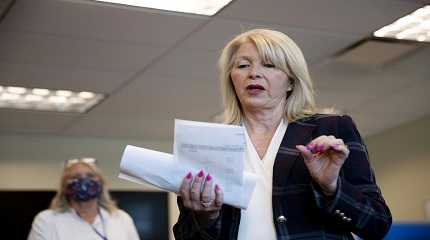
DENVER (AP) — A grand jury in Colorado has indicted a county election clerk who sowed doubt about the 2020 presidential election, alleging she was part of a “deceptive scheme” to breach voting system technology that is used across the country, according to the indictment made public Wednesday.
Tina Peters, a Republican elected in 2018 to oversee elections in Mesa County, was charged with seven felony and three misdemeanor counts, including attempting to influence a public servant, criminal impersonation and first-degree official misconduct. Also facing charges in the case is Deputy Clerk Belinda Knisley.
Over the past year, Peters has appeared onstage with supporters of former President Donald Trump who made false claims that the 2020 presidential election was stolen. Peters recently announced plans to launch a campaign for Colorado secretary of state, on the podcast of former Trump adviser Steve Bannon.
The indictment, filed in Mesa County District Court, alleges that Peters and Knisley were part of a “deceptive scheme which was designed to influence public servants, breach security protocols, exceed permissible access to voting equipment, and set in motion the eventual distribution of confidential information to unauthorized people.”
In a statement issued through her campaign, Peters called the indictment a politically motivated attempt to derail her run for secretary of state. Colorado’s current secretary of state, Democrat Jena Griswold, has accused Peters of violating election security protocol in Mesa County. An attorney for Knisley did not return multiple calls seeking comment.
Both Peters and Knisley turned themselves in to the Mesa County Sheriff’s Office. They were eligible for release after posting bond, according to the agency’s website. Their first court appearances were scheduled for Thursday, sheriff’s spokeswoman Megan Terlecky said.
State election officials first became aware of a security breach in Mesa County last summer when a photo and video of confidential voting system passwords were posted on social media and a conservative website.
Because each Colorado county has unique passwords maintained by the state, officials identified them as belonging to Mesa County, a largely rural area on the border with Utah that Trump won in the 2020 presidential election with nearly 63% of the vote. President Joe Biden won Colorado overall with 55.4% percent of the state’s vote.
Peters in August of 2021 appeared onstage at a “cybersymposium” hosted by MyPillow CEO Mike Lindell, who has promoted Trump’s claims of a stolen election and promised to reveal proof of that during the event.
While no evidence was provided, a copy of Mesa County’s voting system hard drive was distributed and posted online, according to attendees and state officials.
The copy included proprietary software developed by Dominion Voting Systems that is used by election offices around the country. Experts have described the unauthorized release as serious, saying it provided a potential “practice environment” that would allow anyone to probe for vulnerabilities that could be exploited during a future election.
Peters has previously said she had no knowledge of how the copy came to be distributed and declined to say who was with her when the copy was made.
But state officials, in various court documents, have outlined what they believe happened. It began when officials asked the county for a list of people who would be present for a routine visit by the state to prepare voting systems ahead of elections in 2021.
As part of the process known as a “trusted build,” files from the previous election are deleted and the software that manages elections is replaced with the original version. This is a security measure that ensures election officials are using software that has not been altered.
According to the indictment, Peters falsely introduced a person as a county employee during the state officials’ May 25 and May 26 visit for the “trusted build.” County records showed that an access card assigned to the person was used to enter a secure area in the election office the Sunday before.
Authorities have been working to determine the identity of that person, who is believed to have made two copies of the county’s voting system hard drive — one before the visit by state officials and one after it.
The person whose name and background check was presented to state officials ahead of the visit testified before the grand jury that they were, in fact, not present at the state visit and were never hired by the county, according to the indictment.
Peters has said she had the authority and an obligation to make the copies. State authorities, however, said Peters was only allowed to back up certain files and was not authorized to make a copy of the entire hard drive. Federal authorities also are investigating.
In the meantime, Griswold persuaded a judge to prohibit Peters from overseeing last year’s elections in Mesa County and has asked for a similar injunction for this year’s elections.
In a statement, Griswold — who is seeking re-election this year — said: “Officials tasked with carrying out elections do so in public trust and must be held accountable when they abuse their power or position.”
The investigations into Peters’ actions prompted the Colorado County Clerks Association to push for better training and stiffer penalties for election officials who break the law. The Colorado Republican Party issued a statement urging Peters to suspend her campaign.
Peters announced in February that she is running for Griswold’s position. She joins a group of Republican candidates this year who are seeking to oversee elections in their state while questioning the integrity of the 2020 presidential election — despite no evidence of widespread fraud or a coordinated scheme to manipulate voting machines. Experts have expressed concern that candidates who don’t have faith in elections increase the risk of insider attacks or efforts to interfere in vote counting.
Peters faces other legal troubles stemming from allegations that she obstructed a police officer assisting with a search warrant and violated court rules by using a tablet to record a hearing involving Knisley.




